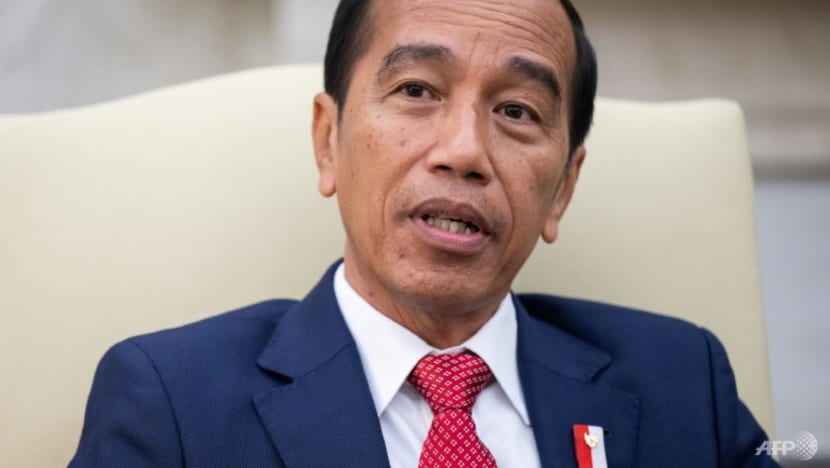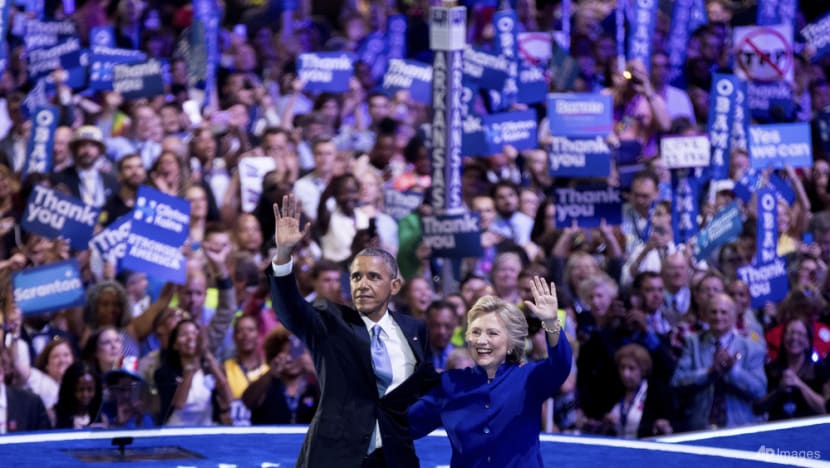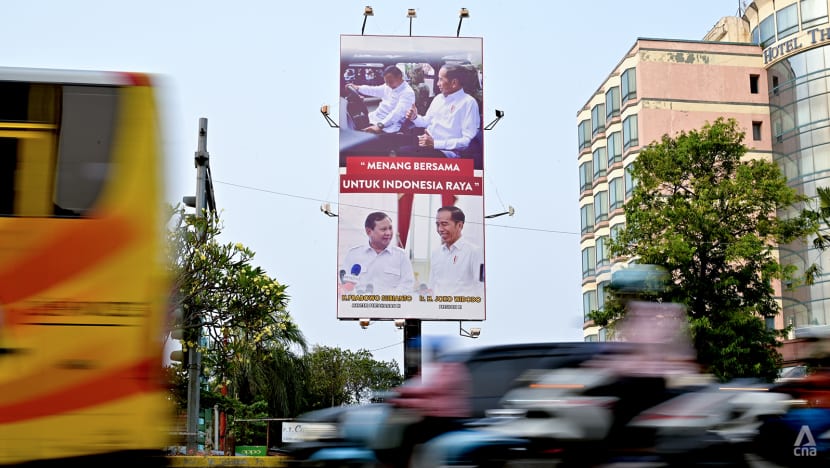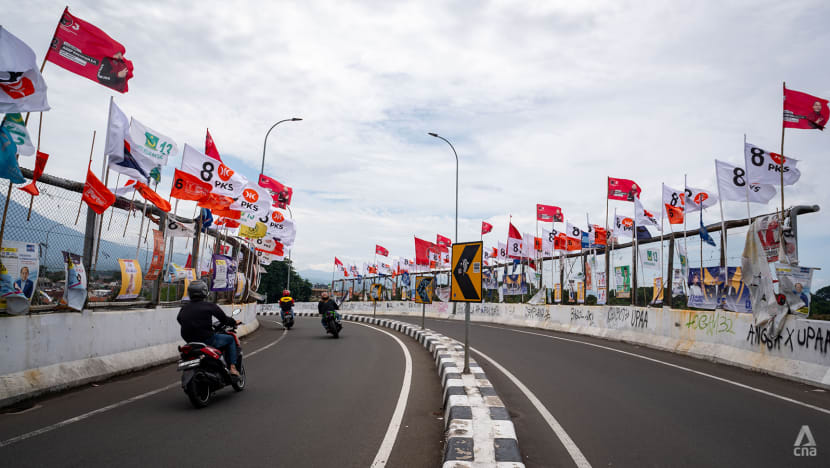Indonesia Elections 2024: Jokowi’s ‘Obama-style’ campaigning for Prabowo sets a risky precedent, say observers
Analysts say the president’s support for frontrunner candidate Prabowo Subianto marks a first in Indonesian politics and could undermine public confidence over the presidency as an institution and the electoral process.


This audio is generated by an AI tool.
SINGAPORE: Indonesian President Joko “Jokowi” Widodo’s increasingly visible support for presidential candidate Prabowo Subianto has been likened by observers to how United States presidents formally endorse and even campaign on behalf of their preferred candidates, albeit with an Indonesian twist.
They say Mr Widodo’s obvious preference for Mr Prabowo through his various indirect shows of support in the run-up to the Feb 14 polls is unprecedented in Indonesian politics and could undermine public confidence in the presidency as an institution and over the electoral process going forward.
President Jokowi is Indonesia’s second two-term president since it adopted direct presidential elections in 2004.
But by all accounts, he has been nothing like Mr Susilo Bambang Yudhoyono who served two terms till 2014 and remained officially neutral in the polls that year, adhering to societal traditions that a non-running president should remain above politics during elections.
In contrast, Mr Widodo, who’s from the Indonesian Democratic Party of Struggle (PDI-P), has participated in events such as state assistance programmes and attended cosy meals with both Mr Prabowo and members of the latter’s coalition network.
The incumbent president has also returned regularly to the critical battleground of Central Java in the weeks before the election in what his office describes as work trips, but some analysts view as open campaigning for Mr Prabowo, who heads the Great Indonesia Movement (Gerindra) party, according to Asia News Network.
Observers say Mr Jokowi’s actions are similar to those of many outgoing US presidents barred from contesting a third term.
Dr Ambang Priyonggo, Assistant Professor of Political Communication at the Department of Digital Journalism of the Multimedia Nusantara University, told CNA that Mr Widodo’s political maneuvering of endorsing a preferred successor is a new style of campaigning in Indonesia.
"This presidential endorsement is similar to the US, where it's usual for a sitting president to back not just their favoured presidential candidate, but also those running for the Senate, the House of Representatives, and governorships," he said.
In the US, when a president is not contesting another term, it's common to endorse the nominee of their party though it’s not mandatory to do so.
The latest example was in the 2016 election when outgoing president Barack Obama not only endorsed Mrs Hillary Clinton but also actively campaigned for her at multiple large rallies in key swing states.
Similar endorsements were seen in the 56th presidential election when Mr George W Bush supported Mr John McCain in 2008, Mr Bill Clinton backed Mr Al Gore in 1999 for the 2000 election, and Mr Ronald Reagan endorsed Mr HW Bush in 1988 for the 51st election.

In contrast, Mr Widodo’s political manoeuvring in supporting a candidate from a different political party makes it even more controversial, say observers, with some questioning if he would go a step further by officially endorsing Mr Prabowo as his favoured candidate.
Dr Ambang emphasised the need to understand the endorsement in the Indonesian political context. While resembling the US model, Mr Widodo’s support primarily aims to retain his political influence by building a political dynasty through his son.
It could also set a precedent for future Indonesian presidents that they have the right to pick their own successor and act like Mr Widodo has in this election, he added.
"There may be concerns about the impartiality of state apparatuses like civil servants, the military, police, and village heads, who are constitutionally barred from engaging in partisan politics. We have heard about the mobilisation of village heads to support Prabowo." Dr Ambang said.
SENDING SIGNALS OF SUPPORT FOR PRABOWO
While Mr Widodo has not officially announced his backing for a specific candidate, he has been publicly signalling his approval of Mr Prabowo - whose running mate Gibran Rakabuming Raka is also Mr Widodo’s eldest son.
Most recently, at a lunch event on Monday (Jan 29), the two were seen sitting opposite each other, deeply engaged in conversation at a meatball soup restaurant in Magelang, Central Java.
According to local media, this sparked a reaction from presidential candidate Ganjar Pranowo who called on Mr Widodo to issue a clear statement of his presidential endorsement in order to prevent misunderstandings, stressing that state officials must act neutrally.
Mr Ganjar will be running alongside vice-presidential candidate Mr Mahfud MD. Meanwhile, presidential candidate Anies Baswedan will be contesting with running mate Mr Muhaimin Iskandar.
Mr Widodo has also recently shared meals with Democratic Party chairman Agus Harimurti Yudhoyono. The Democrats are part of the pro-Prabowo bloc known as the Advanced Indonesia Coalition (KIM).
On Jan 23, Mr Widodo’s wife, first lady Iriana Joko Widodo, was seen making a two-finger salute, commonly used to represent Mr Prabowo’s ballot ticket number, as she exited a car in busy Central Java.
According to the Jakarta Post, civil society groups and observers have urged Mr Widodo to demonstrate impartiality, and have criticised him for deviating from the statesmanship displayed by the country's past presidents in the final year of their terms.
Analyst Firman Noor of BRIN (National Research and Innovation Agency) reportedly said that Mr Widodo has disregarded ethics and intervened excessively in the election.
During his campaign, Mr Prabowo has stated his commitment to continuing the programmes and policies initiated by Mr Widodo, such as health service transformation policies and the maintenance of neutrality in international relations.
In turn, through measures like granting El Niño cash aid for low-income households and introducing the first pay rise for civil servants in five years, Mr Widodo’s involvement in populist programmes has been seen as a mobilisation of state apparatus to shore up support for his choice successor Mr Prabowo.
Mr Habiburokhman, the deputy head of the legal and advocacy division of Mr Prabowo’s presidential campaign team, told CNA that Mr Widodo’s implicit support for Mr Prabowo has been done by other presidents around the world.
“It's similar to when George W Bush supported John McCain in 2008 or when Barack Obama backed Hillary Clinton,” he said.
He added that the main issue is not about the different party memberships of Mr Widodo and Mr Prabowo.
Instead, “the continuation of beneficial programs for the nation and the state” is most important, said Mr Habiburokhman.
LEAVE OF ABSENCE FOR ACTIVE CAMPAIGNING
According to local media, calls have mounted for Mr Widodo to apply for campaign leave.
Under a 2017 law, state officials are required to take, and publicly declare, an unpaid leave of absence and are prohibited from using state facilities.
Mdm Titi Anggraini, an election law expert from the University of Indonesia, told CNA that as long as Mr Widodo is not on campaign leave, he is not allowed to be a campaign participant or make decisions favouring or disadvantaging any election participant.
“Leave must be requested seven working days before the campaign,” said Mdm Titi.
While they are not allowed to actively campaign, through activities such as participating in a rally as a speaker - which requires them to fulfil conditions like registering themselves as part of the campaign team, requesting a leave of absence, and refraining from using state facilities - sitting state officials are still allowed to voice their support for candidates in a personal capacity.

If Mr Widodo does take a leave of absence, there is little stopping him from campaigning for his favourite candidate.
Mr Habiburokhman told CNA that this is “quite normal and acceptable” for a president as long as he does not break the rules.
“Constitutionally, under Article Seven of the Constitution (in Indonesia), a president can even run again for vice-president, so endorsing his preferred candidate is certainly allowed,” said Mr Habiburokhman.
OPEN AND DIRECT CAMPAIGN STRATEGY LIKELY: EXPERT
If no candidate secures more than 50 per cent of the vote on Feb 14, a second round of voting, called a runoff, will take place between the two top contenders in June.
Dr Ambang pointed out that Mr Widodo may lean towards a more open and direct campaign strategy amid worries that securing a single-round election victory for Mr Prabowo will not be easily achieved.
“By doing so, he aims to mobilise his famously loyal supporters to back Prabowo and Gibran,” said Dr Ambang.
“(Mr Widodo’s) actions have been quite explicit …" he added.
“The concern for many is how bureaucrats and state apparatus might interpret this as a 'directive' to support a specific candidate.”
The latest poll by Indonesian Survey Circle (LSI) Denny JA shows Prabowo has crossed the 50 per cent needed to secure a first-round victory.
The Jan 16 to Jan 26 survey showed the former special forces commander had the support of 50.7 per cent of the 1,200 respondents, with 22 per cent supporting former Jakarta governor Anies Baswedan.
The ruling party’s Mr Ganjar Pranowo was the top choice of 19.7 per cent of respondents, and 6.9 per cent were undecided.
HIGH LIKELIHOOD OF CONFLICT OF INTERESTS: GANJAR CAMPAIGN MEMBER
On Jan 24, Mr Widodo raised eyebrows after he declared at a press conference that a president has the right to endorse and campaign for their preferred candidate in a presidential election.
He added that campaigning is a democratic right and stressed that it must be done without using and abusing state facilities, reported local media.
Following backlash over his comments, Mr Widodo clarified two days later that he was simply stating the legal provisions, in response to questions from journalists who had asked about the active campaign involvement of his ministers.

Deputy secretary of Mr Ganjar’s presidential campaign team Ahmad Rofiq called Mr Widodo’s statement “alarming”, stressing that as the head of state and head of government, Mr Widodo should maintain a neutral stance.
“While the election law doesn't explicitly forbid the president from campaigning, there is a high likelihood of a conflict of interests.
For example, the mobilisation of the military and police by Jokowi's administration for Prabowo raises concerns about the fairness of democratic practices,” Mr Ahmad told CNA.
Meanwhile, spokesperson for Mr Anies’ presidential campaign team Angga Putra Fidrian said that while Mr Widodo can indeed endorse any presidential candidate, “it's important for him to be open and transparent about it and refrain from using state facilities for political gain”.
“His ambiguous strategy right now is causing confusion,” said Mr Angga.
“We will remain focused on our campaign efforts and trust the public to make their judgments. I'm confident that people can discern genuine candidates,” he added.
Dr Ambang observed that Mr Widodo has also avoided a situation that could be perceived as a conflict of interest by using "shortcuts" or "invisible hands"; the process of using connections to influence or gain support.
Just days before the presidential and vice-presidential candidates were expected to officially register in the 2024 elections, Indonesia's Constitutional Court chaired by the president’s brother-in-law Professor Anwar Usman ruled on Oct 16 last year that people who have been previously elected to regional posts can contest presidential elections regardless of their age.
Indonesia’s election law also previously required all presidential and vice presidential candidates to be at least 40 years old.
Mr Gibran, 36, is currently the mayor of Solo City in Central Java. He was elected into office in 2020 and sworn in the following year.
Dr Ambang said that while Mr Widodo is entitled to mobilise the support of his followers for the Prabowo-Gibran ticket, “it is crucial that he distinguishes between campaigning as an individual and as the president (by) ensuring clear adherence to the rules of the game”.
Election law expert Mdm Titi urged Indonesia’s Election Supervisory Body (Bawaslu) to monitor state officials with political party ties.
“(This is) to prevent politicisation and misuse of state facilities for electoral advantages,” she told CNA.
She added that the public should also actively scrutinise Mr Widodo’s actions to ensure fairness among all election participants.





















